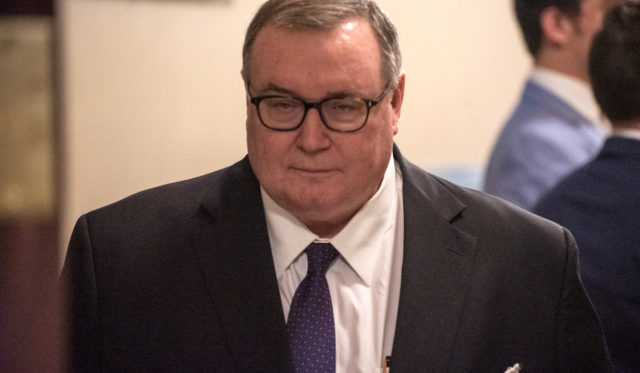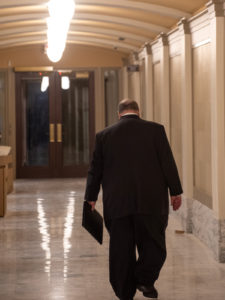
It has been nearly two years since Glen D. Johnson announced his intended retirement as chancellor of the Oklahoma State System of Higher Education, but the former Democratic speaker of the Oklahoma House of Representatives will remain in his lucrative state job for another few months as the search for his successor is only now underway.
After putting the search on hold because of the COVID-19 pandemic, the regents resumed the process in March. With Johnson now set to retire Sept. 30, the regents are working with Buffkin/Baker, a global executive search firm, to conduct a national search.
According to a press release in May, the chancellor position was advertised in a number of national higher education publications and among trade organizations and private industries to attract a “broad, diverse and inclusive candidate pool.”
Regents on the search committee include Ann Holloway, Jay Helm, Joseph Parker and former Republican Speaker of the House Jeff Hickman, who is chairman of the state regents.
“As the new state regents chairman and third since this process began, I am anxious to see the search move forward to the next stage of visiting with potential candidates in the weeks ahead,” Hickman told NonDoc by email.
Hickman said the resurgence of COVID is unfortunate but that he believes the regents can continue the chancellor search in a “safe and responsible manner.”
In his email, Hickman wrote:
With the challenges we face in modernizing our higher education system, navigating trends in student populations, continuing to assess the fiscal viability of our institutions following operational changes and evolving student preferences post-COVID, and the latest issue of one of our state’s two higher education research institutions facing uncertainty in their conference affiliation, which could impact recruitment of researchers, research funding, faculty and students and put at risk the positive impact of technology transfer on Oklahoma’s economy, time is of the essence to bring on board Oklahoma’s next leader for our state’s higher education system.
Applications moving to review process
Though online postings have specified that the application window closed on June 30, Hickman said there is no deadline for applications as the position is open until it’s filled. Buffkin/Baker will continue to receive applications until the committee chooses a candidate.
The regents’ vice chancellor for administration Kylie Smith said that after applications have been reviewed, the search committee will select a group of semi-finalists to participate in first-round interviews.
Smith said the new chancellor’s compensation package has not been set.
A small group of finalists selected from those interviewed will undergo background and reference checks conducted by Buffkin/Baker.
The finalists will be interviewed by the full board during the executive session portion of a regents meeting. The regents will vote to approve the hire of their chosen candidate in an open session of a subsequent meeting.
Those meetings are not yet set, but Smith said the regents hope to hire someone in time to assume the job effective Oct. 1.
A long-delayed search

Johnson announced his retirement in September 2019 and was originally set to leave the position Dec. 31, 2020. The regents asked him to extend his retirement date because of the pandemic.
Johnson’s annual salary is $316,032, and his benefits for 2020 equal another $210,992.19, according to the results of an open records request submitted by NonDoc.
Johnson became chancellor in 2007 after 10 years as president of Southeastern Oklahoma State University in Durant. He was elected as a Democrat in the Oklahoma House of Representatives from 1982 to 1996 and served as speaker of the House for six years.
Gov. Kevin Stitt pushed for the longtime chancellor to be replaced in August 2019, with Johnson announcing his retirement intention the next month.
Asked for comment on the search for Johnson’s replacement, the governor’s chief of communications, Charlie Hannema, said in an email that the office “generally (does) not comment on searches until they are completed.”
Chancellor compensation package details
The chancellor’s remuneration package has long been a subject of conversation and curiosity in the Oklahoma Legislature.
The chancellor serves as the chief executive officer of the state’s public higher education system and reports to the board of regents. The position also oversees a number of vice chancellors.
Hickman described the role as “the leader on academic standards for Oklahoma’s public colleges and universities, the executive over allocations of state appropriations to our institutions, an adviser to the state regents on tuition and fee levels for our universities and colleges, and the strategic planner for Oklahoma’s system of higher education.”

Hickman added that the chancellor’s daily work includes overseeing the state agency’s employees, the operation of the state’s technology and broadband service, OneNet, and the state’s scholarship and student loan programs.
“The chancellor is expected to coordinate and collaborate with our college and university presidents, state legislators, Oklahoma’s congressional delegation, the governor and other statewide elected officials, and the state and federal agencies, and serve as the public voice of Oklahoma higher education,” Hickman said.
According to numbers from the Chronicle of Higher Education, Johnson’s compensation is in the midrange for chancellors and presidents in public university systems.
Johnson’s compensation package breaks down as follows, according to information provided by his office:
- Salary: $316,032
- Non-taxable state benefits, including health, dental, vision, disability and life insurance, and the Sooner Save 401a plan: $10,692.20
- State annual longevity benefit: $2,200
- State annual wellness benefit: $1,200
- Deferred compensation, which sets aside a portion of compensation until retirement: $56,700
- State retirement benefit: $46,199.99
- Other taxable compensation allowances (housing, transportation, maintenance): $94,000
- Total compensation: $527,024.19
(Clarification: This article was updated at 12:23 p.m. Thursday, July 29, to clarify that Glen Johnson is choosing to retire.)





















